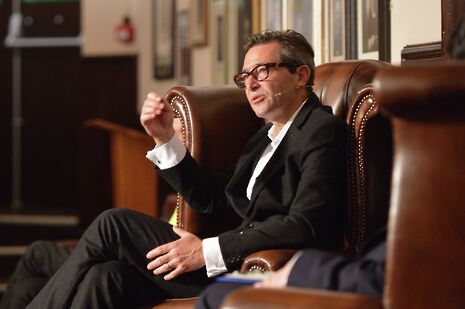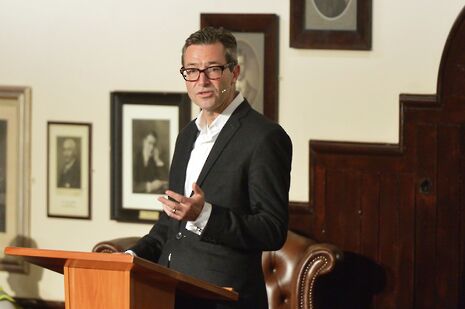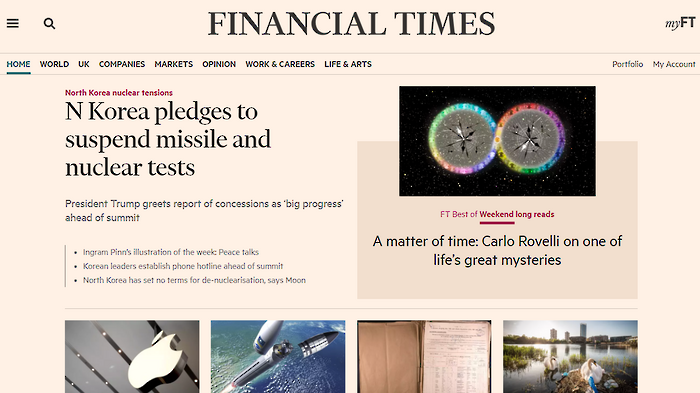John Ridding: ‘The FT mustn’t ignore the digital transformation. We have to embrace it’
The CEO of the Financial Times talks to Julia Davies, reflecting on the paper’s position in a changing industry

If 130 years ago you had told the founders of The Financial Times that they would one day be trying to translate the colour pink, the trademark colour of the paper since 1893, into sound, they no doubt would have been dumbfounded.
Turning the recognisable branding of the FT into something that will be recognisable through the medium of sound is part of the wide challenge of digitising the paper. I spoke with John Ridding, the paper’s CEO since 2006, about this issue, and the other trials facing digitisation of traditional print media ahead of his talk at the Cambridge Union earlier this week. As journalism increasingly migrates to digital platforms, the FT is predominantly focusing on audio technology, regularly producing a range of podcasts and videos. It is also keenly monitoring the rise of the digital companion, such as Amazon’s Alexa, and Google Assistant, and the opportunities that such technologies will bring.
This emerging technology is clearly something that excites Ridding, and the advances of audio and digital are “one of those exponential curves we’ve got familiar with,” he says. I am keen to see how he marries it with the content that the FT has traditionally provided. Creating the branding for a sound, however, is a far greater challenge than branding a visual form of journalism. “Print journalism was enough of a challenge, frankly,” he reflects. When he started out as a journalist, working for the FT in Asia, a path he diverged from because he “never felt comfortable ruining someone’s day,” he could never have foreseen just how technologically-focused, fast-moving, and dynamic, journalism would become.
Ridding argues that in the wake of this transformation, the FT has become more driven in its effort to establish a leading position in the world of journalism. “We mustn’t ignore the digital transformation. We have to embrace it.” This is aided by the publication’s diversity of content. “[The paper] has a role to play for everybody as a very high quality news briefing,” he asserts. From more general sections such as Travel to specialised areas such as the ‘Due Diligence’ online newsletter on Mergers and Acquisitions, the FT has both breadth and depth to offer its readers. “There are a number of layers in the FT orbit, and our view is that people should be able to come in, at a broad level, and drill down really deep. Frankly, there’s no need for anyone to go anywhere else.”
"There are a number of layers in the FT orbit, and our view is that people should be able to come in, at a broad level, and drill down really deep"
I ask him if such an industry-specific publication as the FT can be considered a luxury good. “FT journalism is accessible. A lot of publications, particularly publications trying to be specialist, use a lot of jargon. The best journalists don’t need jargon.” Ridding staunchly defends the FT’s unique role. “Specialist journalism is looking at specific areas in detail, but not in a way that is obscure, and not as a luxury, because quality information is a social good.”

In maintaining the quality of this social good, then, Ridding is equally passionate in maintaining the independence of the editorial team from the paper’s business administration. “One of the most important things about the FT is that we are super clear on church and state, although I’ve never been entirely sure which is which. But whichever it is, I’m one, and Lionel [Barber, the FT’s editor] is the other.” One of the chief reasons the FT has been so successful, he continues, is because “there’s a very clear understanding of [this division], which is essential because the FT’s reputation, branding and authority depends on that editorial independence. Everything we do is based on that editorial independence”. The risk of any conflict of interest “could compromise that, even at a perception level. The way we’re set up means that’s impossible. I can’t, and would never, tell Lionel what to publish.”
"Sometimes in a fast-moving, disruptive industry, you just have to roll the dice"
He contends that editorial freedom is especially important because it creates a clear distinction between the editorial and business sides of the paper, which “enables really strong cooperation and collaboration around strategic initiatives.” He adds that, “nowadays, to be successful in news media, you have to be an integrated organisation.” And successful they are: the FT’s digital subscription is approaching the one million mark, and Ridding is confident it will hit this threshold soon. Its subscription is largely digital, with many City workers reading it as a daily briefing on their phones as they commute every morning to Canary Wharf. When the FT was founded in 1888, its readership would have had no option but to grapple with the broadsheet format, impossible on the Tube in rush hour today.
The FT caters predominantly to those working in high paying jobs in the City. It is these people who have least been affected by the financial crisis of 2008 in the opinion of many, and many hold them accountable for the crash in the first place. Is it tasteful, therefore, for the FT to include a section called ‘How to Spend It’? “The luxury sector has become very dynamic, and created some global giants, and ‘How to Spend It’ provides the best coverage of that industry. It has a different tone to other parts of the FT, but our readers love it. It has a very loyal following.” Ridding also notes that there is a section within ‘How to Spend It’ which lists items available for less than £100. But, as with the FT at large, ‘How to Spend It’ is not merely a list of curated items but also includes lifestyle elements and articles, just as the FT goes widely beyond the remit of being a spartan factual analysis of financial trends and news.
Want to get involved with Varsity interviews?
Meet some of Cambridge's most interesting figures and ask your burning questions. Just join our Interviews Writers group or email our Interviews team to express interest.
One thing about Ridding which surprises me is his refusal to personally invest in the stock market. “It’s a conflict of interest, and I think I’d be useless.” So someone who reads the FT every single day, and has done so for years, would not consider themselves au fait with investing? “If I was going to invest in the stock market I would expect that reading the FT would make me a better investor”, he argues. “It gives you the context and insight into a lot of the forces that drive markets. But I don’t invest.”
Since becoming CEO in 2006, Ridding has led the FT through some of the most turbulent years in recent financial history. His assessment of his leadership is measured. He regrets not always moving fast enough when he can’t see an obvious consensus. “Sometimes in a fast-moving, disruptive industry, you just have to roll the dice”. It’s a sentiment that many non-financiers, who have been footing the bill of corporate dice-rolling since 2008, perhaps wish did not exist. “There have been times where we’ve been doing the right thing but we probably could have done it faster. But we have done a better job than any traditional media organisation in transforming our business [for the digital platform]”.
Ridding professes that the FT charges for its service not as a profit-engineering device. Some might say that paywall-free papers democratise news and make it accessible for those who cannot pay for a £5.35 weekly digital subscription. However, to Ridding, the fact that people are willing to pay to read the FT is a testament to its quality, and is proof that the paper is worth producing at all. He protests that the subscription is cheaper than buying a coffee from Starbucks every day, but the fact that he thinks in these terms is emblematic of the corporate mindset he caters to.
He identifies his most successful trait as “really caring about the FT.” His love for the paper is bolstered by the “meaningful mission” that the FT is on, a “mission that is felt ever more keenly by everyone” who works there.
Optimism is something which characterises Ridding’s outlook. He states that print journalism will not be obsolete in our lifetimes, and that Brexit – on which he won’t comment explicitly now that he is “in business” – is “a whole world of stories”, despite the “uncertainty”, something which is ideal for a newspaper.
Ridding regularly uses the word “mission” when talking about what the FT does. Perhaps the gospel that Ridding is spreading is one of the importance of quality journalism in this day and age: that it is something intrinsically worth paying for, as a mark of respect for its value.
 News / Caius mourns its tree-mendous loss23 December 2025
News / Caius mourns its tree-mendous loss23 December 2025 News / Clare Hall spent over £500k opposing busway 24 December 2025
News / Clare Hall spent over £500k opposing busway 24 December 2025 Comment / Yes, I’m brown – but I have more important things to say22 December 2025
Comment / Yes, I’m brown – but I have more important things to say22 December 2025 Comment / The ‘class’ of Cambridge24 December 2025
Comment / The ‘class’ of Cambridge24 December 2025 Interviews / Politics, your own way: Tilly Middlehurst on speaking out21 December 2025
Interviews / Politics, your own way: Tilly Middlehurst on speaking out21 December 2025








